TransBlack and Beautiful: Acknowledging My Authentic Revolutionary
feature image via shutterstock.com
When I started HRT (Hormone Replacement Therapy), I was in for a big surprise: over time, my skin seemed to be getting lighter. I did some research online and discovered that estrogen therapy plays a role in changing melanin composition, causing trans women to assume skin tones a bit paler than when they started out. I never knew that this happened. When you look at your friends who are on the same journey, honestly, they look exactly the same as far as skin pigmentation is concerned and that’s probably the same for when people look at me. But the internal conflict one has with glamorizing this pretty inconsequential lightening of the skin implies a lot about one’s own journey with self-hate and navigating western beauty norms and ideals.
Colorism is a shackling concept that has been engrained in our community since the days of white imperialism. During the time of slavery, white slave owners would rape young black women and produce fair-skinned babies – black but of a lighter hue. They would be favored by their masters and be allowed to work in their homes or be taught a bit. As time goes on, color and pigment became political. Lighter skinned blacks would benefit more in a system that favored whiteness. A lighter skin complexion was closer to this “ideal beauty norm” and black people around the world would go out to bleach their skin or envy their lighter counterparts. We currently see this sensationalization of fair skinned and light eyed babies and the hypersexualization of those women that are referred to as “red bones.”
My mom is lighter complexioned and my dad is very dark. When they had children, they produced me – this caramel-skinned baby – and then my younger brother — who was as light as a banana. Growing up, I envied my mom and brother. They looked like “heaven” to me. They didn’t have to worry about looking “dirty” or “burnt.” As I grew older and gained a better understanding of how whiteness and anti-blackness influence our sentiments around complexion, I grew to love my beautiful chocolate skin and realized that I wasn’t “burnt” but was actually baked to perfection. I couldn’t help but praise my melanin and flaunt my blackness everywhere I went. I started investing in makeup and worked to accentuate the chocolatey vibe of my skin. I was really learning to love myself and feel beautiful — that is until I started to question my own gender expression. My ego took a huge hit because I suddenly felt ugly again. I felt abnormal. I no longer dealt with this inner turmoil of being black but now I was fighting with feeling comfortable as a person in general. To make a long story short, I decided to embark on the journey of medically transitioning as a transgender woman. Euphoria hit me again once I plopped that first pill in my mouth and everything seemed to be straightening itself out.
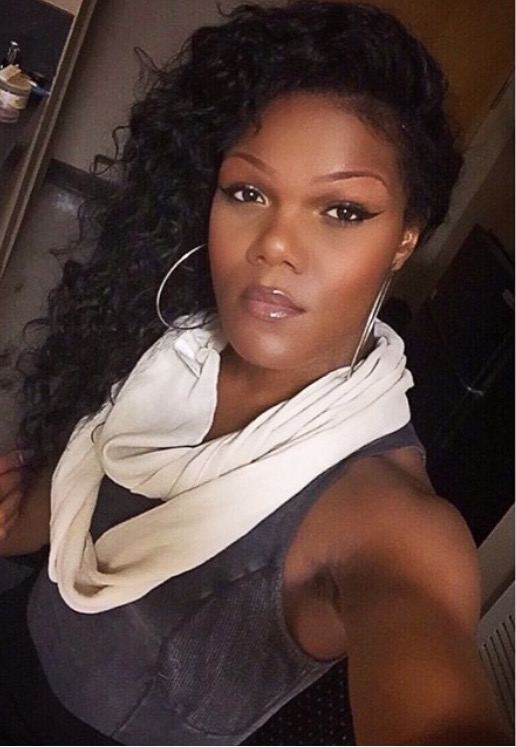
I intentionally chose not to highlight my face as brightly as I use to in this photo.
I noticed a few months later that none of my makeup was working for me. All of my foundations were too dark and my under eye concealers didn’t give me that extra pop that I needed, so I decided to splurge on new makeup to better fit my face. I walked into Sephora to get matched and I found out that I was a lighter shade. All of this time, I thought I just sucked at makeup! I kind of got excited about this. I pranced through the aisles asking for samples of foundation in my new light shade (which was only like a hue to be completely honest). I was flaunting this new skin like I had won the lottery. Ain’t nothing better than being a fresh faced woman, right? That’s what the beauty aisles teach you – brighter is fresher. Brighter is more beautiful. Brighter is more feminine. And on my skin, lighter was brighter. I even found myself in the MAC cosmetics store investing over $100 in a face cleansing collection called “Lightful” intended to brighten the face. How lovely.
Day in and day out, I was looking in my mirror slathering this lightening toner on my skin not really knowing how in the world it was truly destroying my beautiful skin. I’d researched makeup techniques to enhance femininity which always came down to highlighting with concealers two shades lighter than your own complexion in large amounts in certain zones on your face. I even took pictures for social media and edited them in a way to “highlight” my face, which I pretty much just increased the brightness by 1000. I had become mentally enslaved once again.
One morning, while I was applying my new lighter makeup, I accidentally put too much banana powder on which created a shroud of ashy yellow veil all around the center of my face. I stopped and stared back at my reflection. I looked absolutely foolish. Here I was relishing in this depigmentation of my beautiful ebony skin that I no longer looked like myself. I realized that this is what we do in our day to day lives. We allow whiteness to shroud our judgment and our identities in a way that stymies who we really are. We have allowed whiteness to infiltrate our minds and our communities and snatch the wealth of our culture and our history. My loss of pigmentation gave me a tiny slither of hope of accessing that ideal and being seen as beautiful – through white eyes. This phenomena of mine was quite ironic because here I was on a journey of self discovery to truly embrace and uplift the trans beauty that I unapologetically was but in turn, that journey uprooted these problematic anti-black sentiments that I buried deep down inside so many years before, forcing me to hate myself more. How could I blossom but die simultaneously? How do you love all of yourself with exceptions?
Identifying as your Black is to critique and confront whiteness and to acknowledge your rich history. Your blackness is your claim to this land. To be your black is to respect your culture and your family that has built all that has made you exist. I am my Black because I am a Chocolate Goddess created here through the toil of slavery. No longer do I celebrate this skin lightening experience but I use it as a reminder to truly embrace all that is my black in my physicality and in my politics. It’s helped me to realize the importance of intersectionality and affirming the multiplicity of my identities – owning my transness and the experience but ALWAYS centering and focusing my blackness. The forces outside are consistently trying to strip me of that. I will grasp onto everything that makes me the bronze Goddess that I am through and through. Every time I take a hormone injection, I remind myself that these hormones make me the queen that I am but my authenticity in owning my rich black history emanates through my skin and I will always be a goddess because of it. My blackness will forever radiate through my writing and be the vehicle of my thoughts and my sword in battle. Black is beautiful. Black is revolutionary. Black is to be glorified.
On The Silencing of Trans Women of Color: A Response to Trans Glamour vs. Trans Activism
This piece was written and originally published by L’lerrét.
Trans women of color are doing the damn thing and laughing off the scrutiny and criticism of their oppressors. While this piece is a direct response to Elle Boatman and her Op-ed on Advocate.com entitled “Trans Glamour Versus Trans Activism,” I do want to start off by noting that what I say in this piece applies to all persons that seek to silence the many trans women of color who show up and show out advocating for their lives and the lives of others around them.
Before I start to truly critique the piece, let me provide you all with some context. Basically (and I mean basic-ally), Elle has written a piece about the Iconic Candy Magazine cover shoot that featured 14 trans role models and pegged this to be demeaning and harmful to the movement. She even made it look exclusionary and misleading, stating that only Laverne Cox, Janet Mock, and Geena Rocero are trans women who do any sort of activism/advocacy work. Really, Elle?
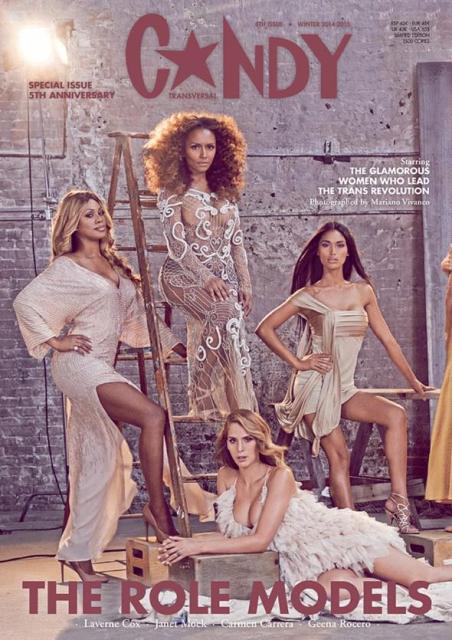
Now, I do agree with the fact that media focuses on femme women and seeks to peg that as ideal but in the scope of the original argument, to be a white person critiquing transgender women who are of color as embodying norms and not representing the whole community and invalidating the work they do as activists, I start to itch. That doesn’t sit well with me. Allow me to elaborate.
I want to first start off by critiquing the idea of celebrity. I think it’s funny that once people of color get any type of nationwide coverage on something other than violence or drugs, they’re automatically pegged as a celebrity. Celebrity is a white centered notion placing higher value on individuals who are coveted and desired. As trans women of color, we don’t have the luxury of being wholly desirable in a cisnormative, white centered society. We are plastered throughout the media only when folk find out that other male celebrities do in fact desire us and they begin to do a slander campaign to strip us down and dehumanize our very existence.
Janet Mock wrote a book and was super successful in doing so. Because she was palatable to the public and sensationalized because they “can’t believe she was born a boy”, she became a hit. Cis folk asked her to speak at various events and they put the pressure on her to try to speak for her community as a whole which she tried hard not to do. None of these women asked for ‘celebrity’. They wanted a lifestyle. They started to actualize their dreams and goals and upon achieving them, they were devalued and pegged as a “trans _________”. They can’t escape their identities nor can they escape the bigotry of the society that will forever seek to muffle all of their efforts to just make a living and be happy.
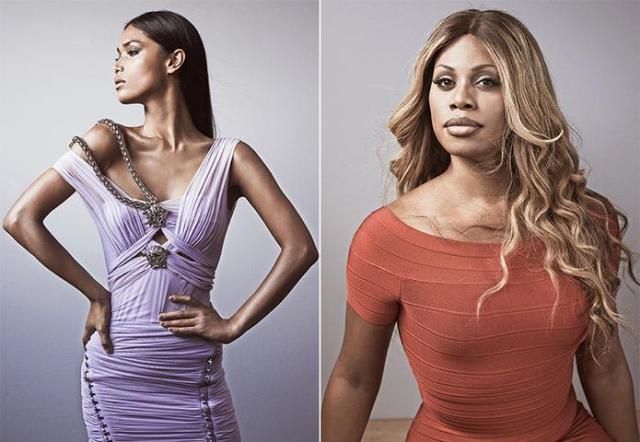
photo from Mariano Vivanco for Candy Magazine
Activism cannot be quantified and I think operating under the idea that it can makes people feel super uncomfortable. As a white woman, you may not understand this, but the simple act of getting up and being in the public eye and proclaiming your transness unapologetically is an act of revolution for every trans person of color, and in that right, they are doing the work. How dare you demean the existence of women who didn’t have to speak on their identity but chose to do so in order to work towards a more inclusive and visible society where young black and brown persons feel value and can imagine dreaming up more than trying to blend in and get “normal jobs” and be respectable; a society where they can finally feel beautiful and in charge of their own destinies. How dare you label the work of fellowshipping to the younger folks looking up to these possibility models as insignificant.
Elle proceeds to state, “Showing 14 conventionally, if not exceptionally, beautiful trans women and advertising them as the leaders of the trans community only reinforces the ‘normality’ of straight, cisgender society by pandering to the pervasive notion that your worth is intrinsically connected to how easily you can mimic the cisgender, heterosexual ideal.” This is a very dangerous statement because it’s focusing on a false notion that trans women in the public eye seek to “mimic” cis people. When was that ever the case? It’s common for trans women to be jealous of other trans women because of the way they construct their identities.
We are so focused on breaking the chains of normativity and ‘ending gender’ that we seek to take away the agency of those individuals who mold themselves in ways that just so happen to be what the greater society deems acceptable or beautiful. Demonizing femmness because it “adheres to patriarchal gaze” is problematic because, in turn, you demonize all folk that long to access femininity. And instead of decentering heteronormativity and the long history of hypersexualization, you just avoid the issue, which still centers heteronormativity and teaches women and any femme presenting folk to cover up and not do what they damn well please with their bodies because “men are watching.” What sense does that make? How does that help anyone?
It’s odd that a white woman is critiquing the ways in which trans women of color perform gender and how they “conform to the norms,” seeing that norms and everything having to do with beauty and gender and acceptability are meant to keep non white folks out. Elle says that these women “blend in” and are “conventionally beautiful,” when that just isn’t the case. Being black in the first place automatically knocks one out of this country’s historical colonialists and white imperialist convention.
Furthermore, I as well as many other black trans women can attest to the struggles of trying to navigate as a trans woman when your body was struck with years of testosterone and you grew like other black men – strong faces, muscles, wider noses, veiny arms, etc. There have been a multitude of conversations amongst trans people of color where they testify to the fact that passing in white spaces is a piece of cake while not so much in our own communities.
Just because your eyes can’t see the struggle and you think “oh they just blend on it” doesn’t mean there isn’t a struggle. Do you remember cycle 11 of ANTM when Isis was harassed by the cast members for having “man hands” or a “man face that doesn’t photograph well”? Do you remember Laverne Cox constantly opening up about her experiences walking in the street and being called a man? Did you not watch the award shows and see the Twitter response with everyone claiming her as a tranny and invalidating her womanhood? Or even comparing her size to Nicki Minaj’s when on The View, and using that to snatch her womanhood away from her?
Do you not hear about a few of the trans models who constantly feel pressure by the industry to get countless surgeries because of the ways in which their aesthetic is masculinized? But everyone is a “conventional beauty” right?
Monica Roberts commented on this issue and very eloquently remarked: “Trans women of color are demonized for their race and being trans, unlike our white counterparts. Especially in light of earlier this year when elements of the white transfeminine community were attacking Janet and Laverne, and all the murdered trans women in the US since June have been TWOC. So yeah, I’m definitely going to ask the question: Whyare glamour and activism issues in this case when it wasn’t for Christine Jorgensen, April Ashley, Caroline Cossey and most recently Jenna Talackova?” *sips tea*
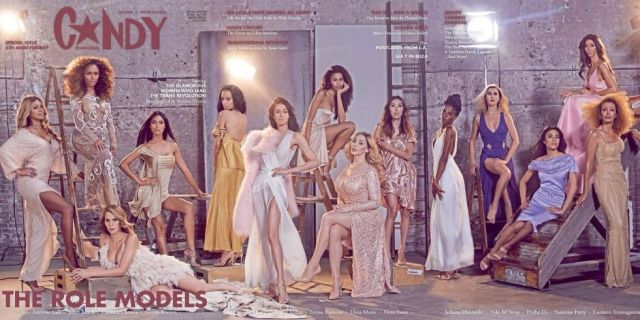
It was also interesting that Elle suggested folk that should have been on the cover and they were white women. Quite typical of her to resort to that and it validates my argument that this is white tears in action and an attack on the women of color doing the work and doing it effortlessly. Are you mad that trans women of color can achieve their goals, inspire others, and look desirable all at the same time? Are you mad that we’re no longer just in the tabloids for ‘sex scandals’ but now for just being bosses and looking like them? Are you mad because they can afford to? Are you mad because the trans movement started deviating from the white people’s “I was born in the wrong body and just want to be normal” narrative and images which have not been dominated by people of color? Why can’t we finally just be allowed to be great? Folk see a lack of whiteness and cry foul when they forget the centuries that folk of color have been marginalized and considered ugly. Because you know about the three trans women of color that the white centered world deems palatable doesn’t mean they’re the only ones out here doing the work.
Elle continues, stating:
Many in the trans community are content to celebrate this as a milestone in the fight for equality. And in a fashion sense, I suppose it is. But even then it’s absolutely not representative of the majority of trans women, let alone the trans community. While it succeeds in its diversity of skin color, it fails to accurately represent the body size and shape and weight, even the sexuality, of most typical trans women, nor does it do anything to highlight how these (admittedly beautiful) women did, in fact, contribute to the fight for transgender rights.
This is quite laughable because she admitted her bigotry in this statement. These trans women of color don’t deserve the title of activists because they don’t “represent the marjoriy of trans women, let alone the trans community.” Really Elle? So you and your buddies deserve it because you all are white and do jobs that adhere to professionalism/respectability politics. And what does sexuality look like to you? I didn’t know sexuality had an aesthetic. Little do you know, not all of these folk identify as heterosexual and we can’t assume that they all even identify as women.
Also, multiple people can’t be faces of trans movement? Are you so pressed about that title that you seek to tear other trans women down for doing their shit well? Jealousy of people of color is super real, apparently. Laughable, but real. And again, these are “typical trans women.” They are just living their lives and doing outstanding work and society dubbed them trailblazers. They don’t have “ideal” bodies by any means. You can ask every single on of them. You can look at them. You can ask them about their experiences. Not all of them got work done. But even if they did, who is shaming them for their own self actualization helping the movement? The work they do doesn’t need to be highlighted explicitly because the proof is in the pudding. Just because their work does not benefit you or your friends doesn’t mean that it doesn’t benefit anyone. There are thousands of trans people of color that look up to and benefit from the work of these lovely individuals. Let me just highlight a few for you.
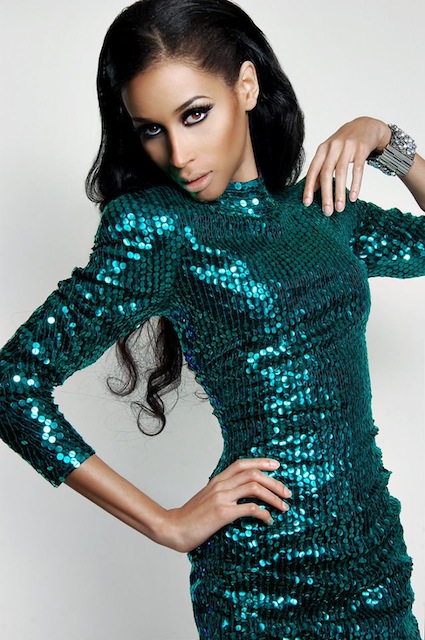
Isis King from ANTM
Isis King was the first transgender woman of color to ever be a part of the show America’s Next Top Model. She made it possible for other little black trans girls to feel that they are enough. She opened the door for the possibility of black trans women to begin to even conceptualize a life where they too can break into the industry and redefine the standards of beauty that long excluded them. Not only that, but Isis has been speaking at colleges around the nation and even has taken the time out to speak to young black trans women of color, one-on-one, to inspire and motivate. But she’s not really doing the work, huh?
Gisele Alecia (better known as Gisele XTRAVAGANZA) is the mother of the House of Xtravaganza in New York. If you know anything about the underground LGBTQ Ballroom culture, you’ll know that houses are made up of a mother or father who take in young LGBTQ folk that have been thrown out of their homes due to homophobia, or abandoned, or are just looking for work/money to survive or thrive. They provide shelter and survival for these folks in exchange for money that they earn walking in balls throughout the nation to help the house thrive and continue to be a force. She’s done so much more but I think that qualification is enough for your white definition of activism, right? But she’s not really doing the work, huh?
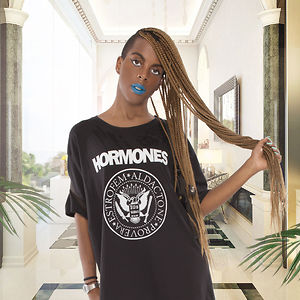
Juliana Huxtable via topicalcream
JULIANA HUXTABLE! She’s the queen of non conformity! She embraces the politics of sexuality – a concept misconstrued when adjacent to black women in general. Her style is against respectability politics and acceptability. Not only that, but Juliana blurs the gender boundaries in fashion and is even identified as a queer DJ, hoping to ensure solidarity among self identified sisters across the whole spectrum. But she’s not really doing the work, huh?
Carmen Xtravaganza is also a mother of the international house of Xtravaganza. She was in the LEGENDARY documentary Paris is Burning. In an interview with the great Monic Roberts with TransGriot, she was quoted as saying:
The kids today have a very shallow understanding of being trans. For them it’s about looks and looks only. Yes, it was about how do I look, but back then we had a sense of self and understanding about core values of community. Nowadays there is a lot out there for younger trans folks to access compared to the 70’s and 80’s and 90’s. This is something I’m on a mission to change starting with speaking out and explaining my life narrative. I am involved in developing a project with my sister Koko Jones Xtravaganza called “Stories From The Edge.” Our vision for “Stories From The Edge” is to travel to colleges and community based organizations around the country to tell our stories, which vary, and explain that everyone has a different path and no path is wrong as long as you get to where you want to be.
But she’s not really doing work, huh?
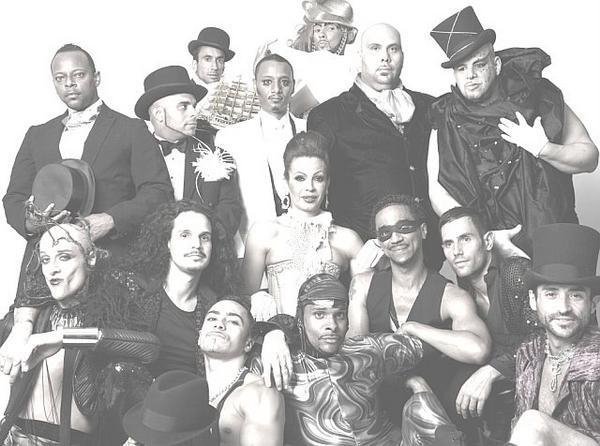
The Legendary House of Xtravaganza via carmenxtravaganza.biz
I could go on and on but I know my sisters and wouldn’t dare justify their contributions or lives to those who don’t value them. If you decided to do a little more research and not just go off of what the white cis media tells you about these folk, you would know this information and then some. If you decided to take the time out to not slander and invalidate these people, and actually learn some history outside of the white shit y’all force down our throats, you’d realize how fucking awesome these people are. If you decided to ask somebody, you’d realize that trans women of color have ALWAYS been breathing life into the movement but the media stripped their accomplishments away and hid their identities. But the women in this CANDY cover are the Marsha P. Johnsons and Sylvia Riveras and Miss. Majors. They are the legacies and the vision. They are the revolution. They are me and my sisters. They are a force and we refuse to allow you to take that away from us.
Elle ends her Op-ed with “So let’s recognize this photo shoot for what it is: a highly successful, Westernized, heteronormative, transgender fashion statement. Let’s not conflate that with an accurate portrayal of the trans* community or its activism.”
While I do believe that passing privilege is real and I do think that certain folk embody beauty norms better than others, I question the validity of the notion that trans women of color ever embodied heteronormative, westernized “transcend fashion statements.” Especially when I see dark skin, box braids, natural curly hair, curvy figures, and oh – the fact that most of them are anything but white, and they pridefully accentuate that history.
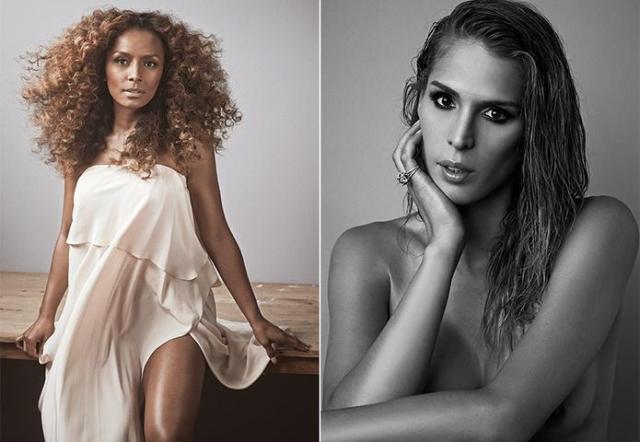
photo from Mariano Vivanco for Candy Magazine
So I ask you: Are those lists that the cis white media publishes to honor trans activists that actively exclude trans people of color — besides the few names they deem acceptable — not enough? Are the white-dominated GLAAD awards not enough? Is Trans 100 not enough? Are the multiple articles on certain white trans folk winning homecoming or fighting school battles or dating one another not enough? Was the T-Word not enough? Hell, are your history books and the indoctrination of young black and brown boys in girls in education and socially not enough? Get it together.
Transgender Day of Remembrance: Critique is Resistance; Resistance is Revolution
feature image art by Wriply M. Bennet
I am L’lerrét Jazelle Ailith. I am Lourdes Ashley Hunter. I am Janet Mock. I am Laverne Cox. I am Isis King. I am CeCe McDonald. I am Islan Nettles. I am Mia Henderson. I am Shelley Hilliard. I am Brittany Stergis. I am Tiffany Edwards. I am Gizzy Fowler. I am Marsha P. Johnson. I am every black trans woman that has had to live her life fighting the systems and people around her that seek to eradicate her existence. I am the woman that you have beaten, taunted, harassed, fired, and shamed. I live authentically in my truth, blazing a fiery path behind me that actively melts away the icy, exclusionary aura of the world that I must navigate. My hands are outstretched and am grasping every single one of my sisters that the TDOR lists are trying to engulf. I am them. They are us. We stand in solidarity to redefine our own realities and to rebuild our community that was broken apart at the hands of white supremacy and colonialism. We stand against the entrapment of the boxes of gender normativity and rebuke those who seek to place invisible cloaks across our claimed identities and articulated narratives. We refuse to operate in ways to fit systems and institutions that are inherently built to keep us out or seek to subjugate us. We are the revolution. We are stronger than the commodified victim narrative that has been forced onto our lived experiences. We are greater than the pity and sensationalization of all the TDOR events around the nation.
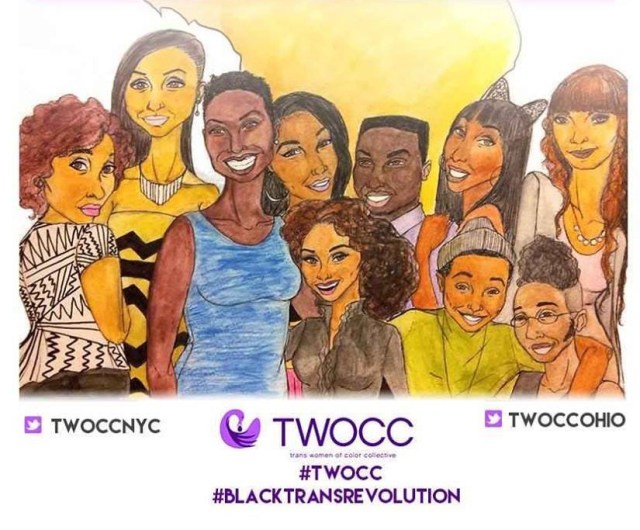
Art Wriply M. Bennet
I want to take a moment to honor all of my sisters who have been murdered for living in their truths. If it weren’t for them dying for what they believe in and dying for each and every other sister that walks this Earth, I wouldn’t be here owning my voice. I wouldn’t be able to stand strong and unwavering proclaiming and owning my transness, blackness, queerness – hell, my penis! – if it weren’t for those Goddesses who owned those things and never let go. I wouldn’t have been inspired to love this skin I’m in if it weren’t for their legacies. But I also uplift the sisters by my side who live and love and teach me each and every day to never apologize for my authenticity. While we are all at our TDOR events or celebrating trans lives throughout the week, let’s begin to push our analyses a bit further. Let’s begin to engage in dialogue that acknowledges intersectional identities.
I implore you to sit back and ask yourself how you contribute to the violence and injustice against trans women of color. How do you reinforce the marginalization and ostracism of myself and my sisters? It’s all fine that we become aware of our lives but we need more than for you to finally see that we are walking this Earth. We need you to hear us. We need you to sit quietly, take notes, and begin to conceptualize what a restructured system that is void of misogynist, racist, ableist, etc oppression would look like. It’s not enough to read the names of my sisters killed off by the normative nature of this capitalistic system. Moments of silence are not enough. Calling us courageous is not enough. Having one or two trans friends is not enough. We need to begin to develop more complex analysis of the world in which we live. We need to rebuke assimilationism. It is an imperative to eradicate the prison industrial complex and the criminalization of sex work in all forms. I implore you to begin to question what has been engrained in you since birth. Own yourself and you can begin to see the truth.
I envision a period where being a black trans woman in all her glory is not deemed “courageous” or “revolutionary.” It is a ridiculous notion to think that one being themselves is revolutionary. I want to be able to walk to McDonald’s at 9:00 at night and not have to worry about being killed by transphobic bystanders, sexually molested by misogynistic jerks, or both of those things being perpetuated by police officers. I want to see my sisters out of jail cells. I want to see my sisters with jobs. I want to see them happy. I want to see black trans brilliance everywhere and until that day comes, we will not stop. The movement will always continue. Our voices will forever be the loudest. We will always walk with the fervor and passion that our fore sisters embodied. We are the revolution. We are Goddesses. Our lives matter. I am the Trans Women of Color Collective. Our voices slay.
November 14th-20th is Trans Awareness Week, leading up to Trans Day of Remembrance on the 20th. This is a week where we raise visibility for trans people and address issues that affect the trans community. For Trans Awareness Week this year, we’ve asked several of our favorite TWoC writers to come in and share their thoughts and experiences with us. TWoC started the entire LGBTQ movement in the U.S. And they continue to be the victims of most of the anti-LGBTQ violence and discrimination. If we aren’t centering things on them, we are failing.